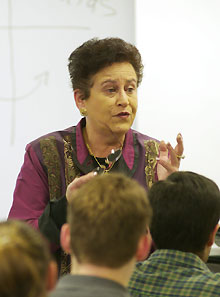For more archives, go to the Advance Archive/Search Page.
Politics Of Budgeting Class Helps
Students Grasp Democratic System
Carol Lewis calls it "shift and shaft."
That's the process by which legislators move money from one part of the state budget to another to try to satisfy different constituencies - and end up penalizing one group or another.
 |
|
Carol Lewis, a professor of political science,
teaches a class on the politics of budgeting, which, she says, helps students
understand the political process. Photo by Melissa Arbo
|
"You move money from one year to another, one agency to another, from the public sector to the private sector," says Lewis, a professor of political science in the College of Liberal Arts and Sciences.
"The use of deficit spending is a classic example of shift and shaft," she adds, noting that, in this example, it's the younger generation that gets the shaft.
Lewis, who has taught the politics of budgeting for more than 25 years at UConn, covers the concept as one of the topics in her classes.
"The politics of budgeting is everywhere," she says, "at this University, in Mansfield, within families. You can't escape it. Budgeting is the biggest game going, and it's a political animal. I call it 'shift and shaft' - legislators shift funds to one group or agency from another - and that explains the other part of the phrase."
Lewis says the politics of budgeting is a vital class for students, especially political science and journalism majors, who may have to deal with budgets during their careers. It's also not a bad thing for anyone to learn about.
"Budgeting is not a technical subject. It reflects public policy. It is core to the democratic system," she says. "There are few things in life that are certain, but one of them is that if it's not in the budget, it's not going to happen.
"Budgeting is the allocation of scarce resources through the political process. It's about partisanship. It's about elections," she adds. "It's a key to understanding what's going on in the country, in the state, or in your town."
David Agrawal, a junior majoring in political science who is taking Lewis's course this semester, understands that point perfectly.
"Look at the President's No Child Left Behind Act," Agrawal says, referring to a policy of the Bush administration that will financially penalize public secondary schools that do not meet strict federal testing requirements. "It's a federal act, and many people are aware of its political implications, but many more people are not aware of its budgetary implications, especially in a state with no money to spare. It's a federal mandate that demands changes and improvements, but includes no funding for the states. So costs associated with the program trickle down to the towns, and they have to raise local taxes or cut staff. Townspeople don't understand the process and they take out their anger on local officials."
Agrawal viewed the process in person recently, attending a budget hearing in his hometown of Vernon. Lewis requires all her students to attend a local budget hearing and write a report.
"They were discussing the education budget," Agrawal says, "and the point was made that the mayor had proposed an increase in their budget, and that was a good thing. But staff salaries had recently been increased after an arbitration hearing in Hartford. That pushed the budget needs higher, so even with the increase, they will wind up having to make cuts in the school system's programs."
The mayor made his political point, Agrawal says. The teachers won their raises. The school board will feel the wrath of parents whose favorite program - or teacher - is cut.
Understanding budgeting, he says, may not make people any happier with the choices, but they will at least be secure in the knowledge of why things happen.
Agrawal also says he enjoyed visits to the class by University President Philip Austin, who discussed the making of the University's budget, and by a state legislative staff person who talked about the work involved in crafting the state budget.
Besides guests, Lewis also uses props in her classes, such as a bougette, a small purse carried by the prince's aide in medieval Europe to carry items they could barter and, perhaps, documents.
"Then I'll hold up a thick, heavy volume like the state budget, and ask if decisions are any better in today's budget compared to the old bougette. The point is to hook the topic to an image students will remember," she says.
Students find the props interesting and fun, she says, while also helping them begin to learn the basics of budgeting: finding ways to stretch limited resources to fill larger needs.
She also uses Connecticut budgets and, through the Internet, the City of Boston's budget. And pizza.
"I use pizza constantly, as an example of predictability and stability. It's nice to know UConn will be open and pizza will be delivered. It's a very useful illustration of what happens when budgets work," she says. "My public administration class opens a pizza parlor, from scratch, and pretty quickly it becomes a huge bureaucracy and they realize how simple plans are not quite so simple, that many needs have to be met.
"If I can bring students' comfort level up with hands-on activities, they'll try to grasp the concept. If they try it, they'll begin to learn," Lewis says. "And it's very important for the students - for all citizens and taxpayers - to learn, to understand, how budgets drive decisions.
"Budgeting," she adds, "is about identifying and then building what we want for our children and our children's children."

